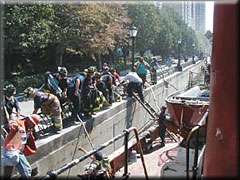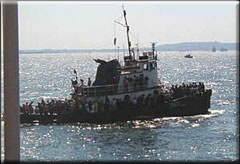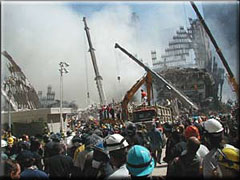When Tech Seemed Irrelevant: iBreakfast Looks Back to 9/11
Despite everything – we had a hero. But not who or what you
expected….
 9/11 was a double whammy for Silicon Alley. The dotcom bubble
had burst in April 2000 and by September 2001, whatever was left of the first
wave of dotcom'ers was barely hanging on. We had even scheduled an iBreakfast
about coming back from the crash with BusinessWeek editor and author, Michael
Mandel.
9/11 was a double whammy for Silicon Alley. The dotcom bubble
had burst in April 2000 and by September 2001, whatever was left of the first
wave of dotcom'ers was barely hanging on. We had even scheduled an iBreakfast
about coming back from the crash with BusinessWeek editor and author, Michael
Mandel.
And then this!
We remember the personal tragedies: the crowds gathered at
open air spaces all over Manhattan holding up pictures of loved ones
and asking if anyone had seen them. These were the saddest gatherings I have ever
witnessed…..especially because we all knew the answer.
As for Silicon Alley, it seemed irrelevant.
The pictures they held up were not digital. Social Media had
not arrived to make to connecting with loved ones easy. My neighbor, one of the
few survivors from Canter Fitzgerald, was only recognized in the hospital because of his
dentist’s business card in his jacket.
Digital was just not around. Cell phones were the primary means for people to connect. One colleague, who was in the concourse beneath
the towers, was warned to get out by a phone call from a relative in London!
 The only contribution made by a member of the Silicon Alley
community that I am aware of, was by Andrew Furber, who happened to be a
volunteer on a retired NYFD Fireboat. Andrew went down to Battery City with the
fireboat, doused the fires with their powerful hoses and then cut away rebar to
help trapped survivors. All pre-war technologies and the Fireboat was a survivor of that depression too.
The only contribution made by a member of the Silicon Alley
community that I am aware of, was by Andrew Furber, who happened to be a
volunteer on a retired NYFD Fireboat. Andrew went down to Battery City with the
fireboat, doused the fires with their powerful hoses and then cut away rebar to
help trapped survivors. All pre-war technologies and the Fireboat was a survivor of that depression too.
Later, when Andrew got home, he took time to update his website.
The
rest of us were just helpless bystanders or worse, victims.
The iBreakfast held a Silicon Alley Town Hall meeting called
the Technology Response Council and followed up with several events that introduced
us to facial recognition (Visionics), document verification and various security-related technologies.
In our Town Hall Meeting we drew some of the following
conclusions:
- More sophisticated warning and information system using web technologies. (Probably done – thanks to smart phones and numerous other emergency systems.)
- An "EZ Pass" System for verified travelers. (Somewhat done.)
- More web driven surveillance and Artificial intelligence technology (We shudder to think…….)
It is worth asking how we would cope if a terrible disaster were to
happen today?
One thing is certain, the dotcom revolution not only survived but moved
to center stage.
So will America.
REPORTS FROM THE 9/11 ERA ON SILICON ALLEY
A Special thanks to Michael Drapkin for Remembering
From October 2001
--------------------------------------------------------------------------------------------
WTC:
THE HERO WEB MANAGER AND THE LITTLE FIREBOAT THAT COULD
How many of us have felt remarkably useless in the
aftermath of the Sep. 11 attack?
 You wouldn't if you were Andrew Furber, an
e-business integration project manager who has worked with the iBreakfast
organization on several projects in the past. Furber had been a volunteer member
of the John J. Harvey, a retired 1931 New York City fireboat that group of
enthusiasts had revived. His work on board, and on her pier] as a welder and
engineer led him to a fill-in job after he was laid off from his company,
dmind.
You wouldn't if you were Andrew Furber, an
e-business integration project manager who has worked with the iBreakfast
organization on several projects in the past. Furber had been a volunteer member
of the John J. Harvey, a retired 1931 New York City fireboat that group of
enthusiasts had revived. His work on board, and on her pier] as a welder and
engineer led him to a fill-in job after he was laid off from his company,
dmind.
On the day of the bombing he was cycling to work on
Pier 63 in the Chelsea area when he saw the flames appear on the Towers. As he
headed toward the fireboat he saw dazed people stumbling up the West Side
Highway.
When he arrived, he learned that NYFD dispatchers
had called the mighty fireboat back into service under her last designation as
Marine 2. As a working fireboat with powerful water pumps, she was critical to
the rescue effort because the water supply downtown had been incapacitated.
 When they arrived at Ground Zero the fireboat crew
set about reconfiguring the hoses to supply water to the firefighters. Furber,
whose background is in telecommunications, satellites and the web was pressed
into service as an oxyacetylene steel cutter. Wielding his fiery torch, he followed
the rescue crews to cut apart steel beams so that trapped people could be
retrieved.
When they arrived at Ground Zero the fireboat crew
set about reconfiguring the hoses to supply water to the firefighters. Furber,
whose background is in telecommunications, satellites and the web was pressed
into service as an oxyacetylene steel cutter. Wielding his fiery torch, he followed
the rescue crews to cut apart steel beams so that trapped people could be
retrieved.
Furber returned to the site every day working long
hours until Friday when he was shut out of the site because of heightened
security during President Bush's visit.
 When asked how he dealt with the horrific scene,
Furber, who has nothing more than a lapsed CPR and 1st Aid instructor
certification, said "I am really lucky that I was able to help."
Being able to do something made him quickly get over the horror. And weeks
later he has adjusted well, knowing that he had an effective part to play in
the Tragedy.
When asked how he dealt with the horrific scene,
Furber, who has nothing more than a lapsed CPR and 1st Aid instructor
certification, said "I am really lucky that I was able to help."
Being able to do something made him quickly get over the horror. And weeks
later he has adjusted well, knowing that he had an effective part to play in
the Tragedy.
We are very proud of Andrew at the iBreakfast and
we would like to honor the spirit of volunteerism and simple, matter-of fact
heroism he exemplified. For those of you who wish to share your good thoughts,
contact him at SAiBC@andrewfurber.com. For those fascinated with the little
fireboat that could, visit www.fireboat.org.
--------------------------------------------------------------------------------------------
AFTER THE DEPRESSION - NEW BUSINESS MODELS FOR THE
NET
Report on the Sep 25th iBreakfast Meeting
After a moment of silence, the September 25
iBreakfast considered the terrible events we have encountered. No one really
asks to be a prophet but it was hard to ignore the sadly prophetic tone of the
event: it had been specially scheduled later than the typical 3rd Wed. to avoid
the High Holy Days, and the topic - recovering from the depression was, in the
words used to describe the speaker, Michael Mandel's book, "eerily
prescient."
Mandel, the economics editor of BusinessWeek, who
also wrote this week's cover story, predicted the drastic depression, in his
2000 book, "The Coming Internet Depression" because of the underlying
business model of innovation that he had discerned: technology R&D had
essentially been outsourced to VC-funded start-ups. Since the whole industry
had grown on the expectations of VC returns from IPOs and colossal buyouts more
than the start-ups collapsed: big companies had been feeding off the start-ups
and the telecom expansion which in turn had been paying for the massive
underlying infrastructure. Once the market collapsed, it would do a great deal
more harm than damage a few VC portfolios -it would undermine the entire
technology, new media and telecom chain.
The reason he predicted that the depression would
be even worse than expected is because the major corporations may have
survived, having outsourced their R&D, now had very little new product in
their the pipeline.
Nevertheless, Mandel felt there was enough of an
infrastructure in place that the outlook was fundamentally optimistic for the
long term. The shakedown, in that scenario was probably healthy.
But that was before September 11th.
The future is much more difficult now: government
support will never be enough to recover losses, the human and business
confidence losses will continue for months to come, there is no equivalent of
turning technology factories into war production factories and it is clear that
the government will take over what had once been the free market and VCs for
funding and business support.
That means a slower moving, substantially less
entrepreneurial environment. But the industry will have to get used to it in
order to get along.
In a panel following Mr. Mandel's speech with Larry
Chase from Chase Online Marketing, Michael Drapkin from XB5 and Mark
Oster from Grant Thornton, it was clear that companies need to think long and
hard about back up procedures and much business will surround the retooling of
business for security. If there is a bright spot - it is that spending for
civilian security will increase dramatically and that may present opportunity
for entrepreneurs.
Michael Mandel welcomes further discussion at michael.mandel@businessweek.com
http://www.drapkin.net/news/wwwibr.html
2 comments:
Hi Alan,
I loved reading this piece! Well written!
Merlen Hogg
ms polymer
Thanks!
Post a Comment